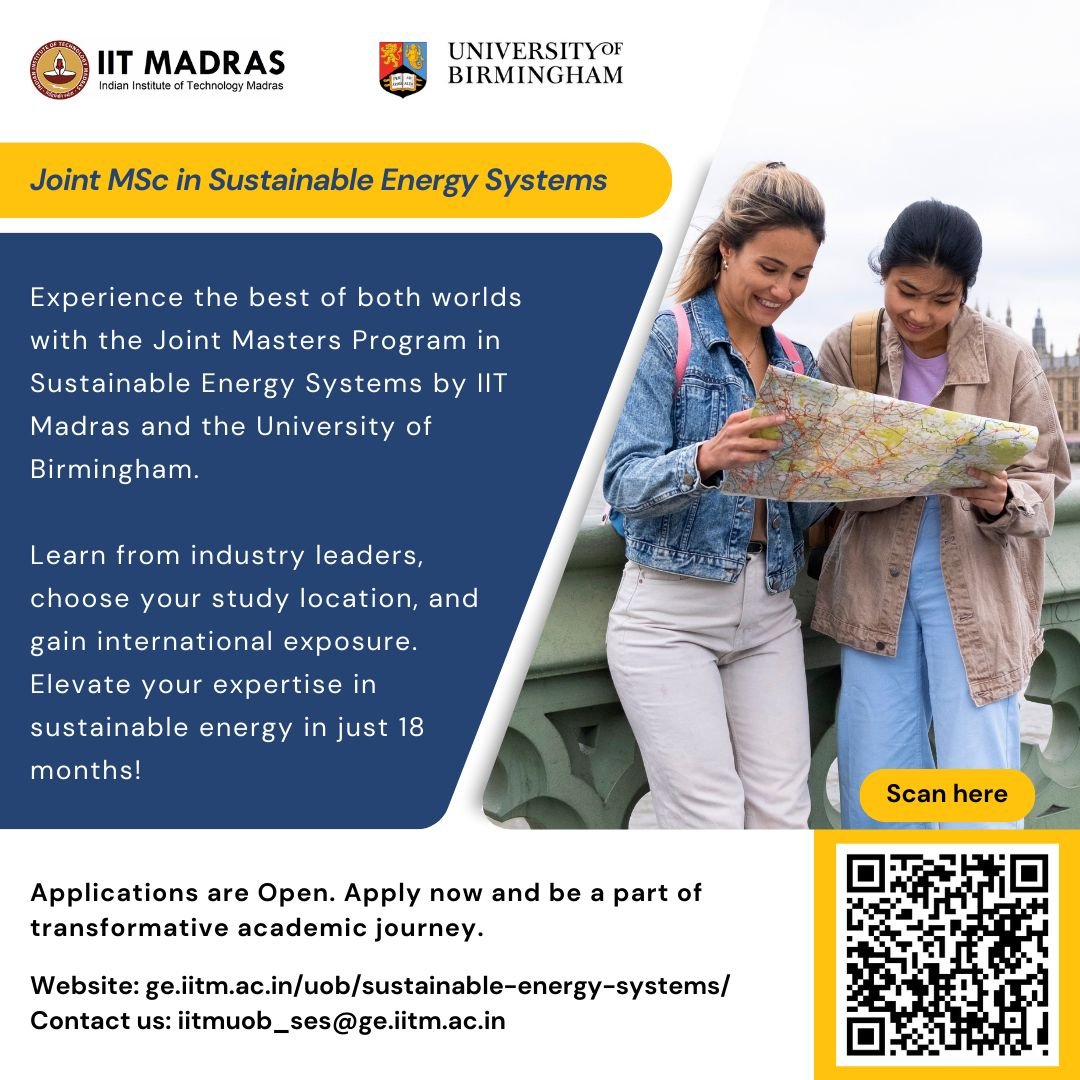ENERGY CONSORTIUM
Accelerating Net Zero
CARBONLITE CHRONICLES:
QUARTERLY UPDATE
FROM THE ENERGY CONSORTIUM
JULY- 2024
THE ROAD AHEAD
A Message From The CEO
Dear Energy Enthusiasts,
Welcome to the second edition of CarbonLite Chronicles, the quarterly newsletter of the Energy Consortium.
Each newsletter will cover a quarterly chronicle for some of our key industry collaboration updates, consortium highlights, and valuable insights relevant to the energy sector.
India, at the end of 2023, became 4th globally in Renewable Energy Installed Capacity, 4th in Wind Power capacity and 5th in Solar Power capacity. The next frontier in Wind for India is offshore and the announcement earlier in May of the Jaisri and Venkat Rangan Wind Energy Center of Research Excellence as the eighth center under the Energy Consortium umbrella will fast-track research. Our faculty and researchers and collaborating with the Denmark Energy Agency and its Center For Wind Energy at MNRE with a specific focus on Offshore Wind.
We are fast moving towards green hydrogen as an alternate energy carrier and also progressing heavily in CCUS areas. I had the opportunity to visit Climeworks carbon dioxide capture plant in Reykjavik, Iceland earlier in May. This Swiss company uses a direct air capture (DAC) adsorption-desorption-based process to capture 4000 tonnes of CO2 from air annually at their 0.42 acre plant. This is currently one of the largest commercial-scale pilots that is being run other than in China. There are similar efforts underway for establishing large-scale facilities in India. There is a need to dedicate research focus on economical technologies and our faculty groups are engaged in working with the Department of Science and Technology on developing specialised programs. Prof Rajnish Kumar is leading efforts at Energy Consortium. His team have developed a DAC setup as well as a containerized demonstrator where novel solvents and sorbents can be evaluated. We have two featured stories in this newsletter by our researchers on how they are adopting novel approaches and developing new methodologies for addressing the economics of scale when it comes to CO2 capture.
Warm regards,
Nikhil Tambe
CEO,
Energy Consortium, IIT Madras
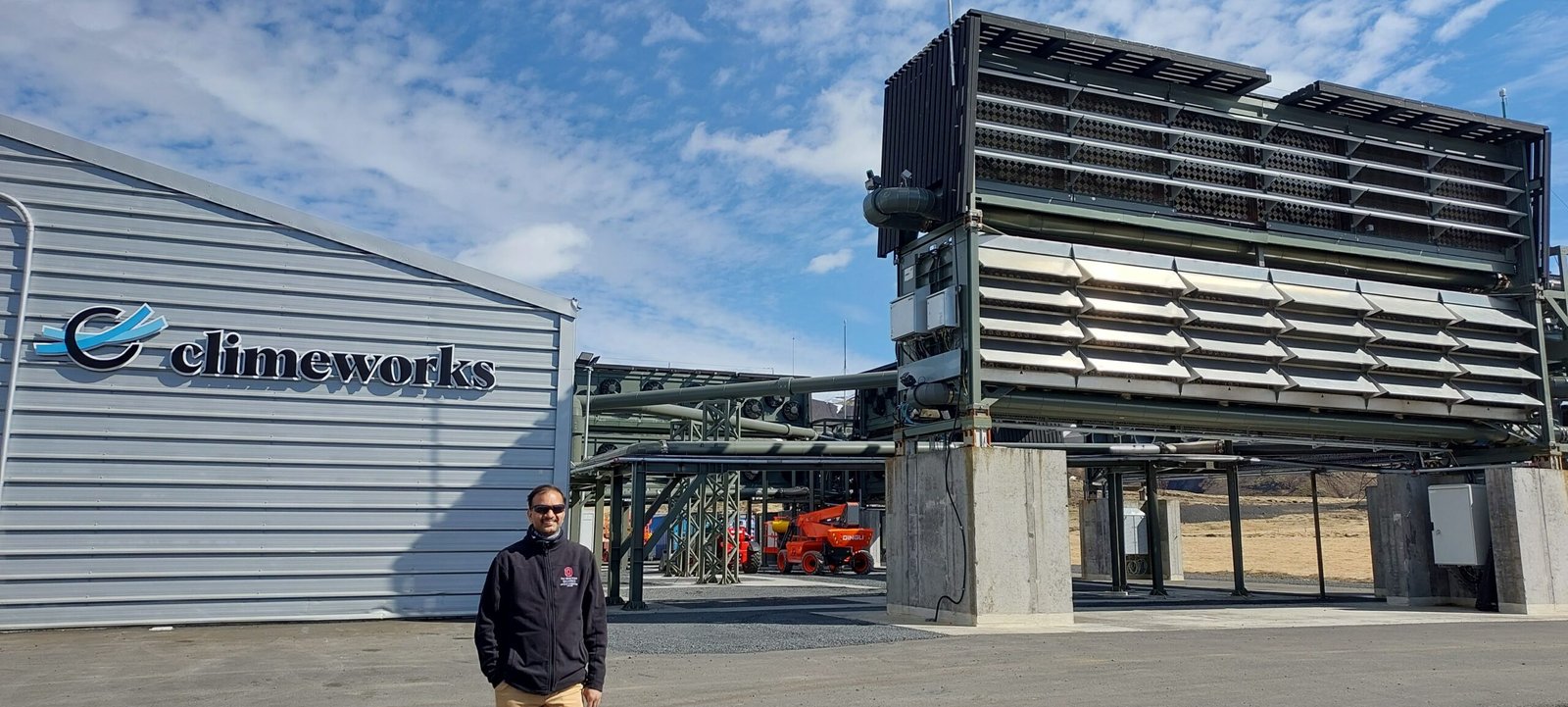
POWERING CONVERSATIONS
The Energy Consortium - IIT Madras Collaborates with Infosys to Drive Digitalization in Energy Transition

The Energy Consortium at IIT Madras announces its ongoing partnership with founding member, Infosys. This collaboration underscores digitalization as a crucial enabler for achieving a streamlined energy transition.
Mr Anil Narayanan, Mr Surya Chavali, Mr Pandiarajan Palanichamy, and Mr Sudarshan Gopalan from Infosys visited our campus for a day of collaborative discussions with our faculty on the latest developments in the field.
Our collaborative efforts prioritize accelerating the development of both early-stage and mid-TRL (Technology Readiness Level) technologies. This shared mission fuels our commitment to make significant progress in the energy transition journey.
The Energy Consortium and Infosys are not just discussing change – we’re powering it together.
Fostering Collaboration with Denmark Energy Agency for Clean Energy Solutions
The Energy Consortium at IIT Madras recently welcomed a delegation from the Danish Energy Agency (DEA) to explore exciting opportunities for collaboration in clean energy.
The DEA delegation gained valuable insights into the Consortium’s initiatives and identified promising areas of mutual interest, particularly in offshore wind power. This visit underscores the immense potential for partnerships focused on knowledge sharing and collaborative research.
The collaboration highlights the growing importance of international cooperation in tackling global energy challenges. By combining expertise and resources, India and Denmark have the potential to accelerate the development and implementation of clean energy solutions significantly.
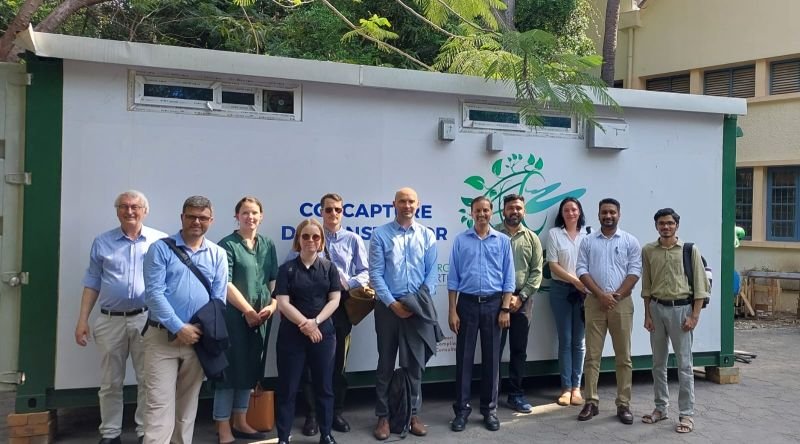
ENERGY BRIEFS
ONE STEP TOWARDS A LOW CARBON FUTURE
Topic – Challenges in CO₂ Capture Processes: The Way Forward
Authors – Paridhi Goel, Durga Ramadas, Haile T. Jose, Abhimanyu Singh Khichi, Swapna S. Rabha Department of Chemical Engineering, Indian Institute of Technology Madras,
The excessive emission of carbon dioxide (CO₂) from industries, power plants, and other sources plays a critical role in global climate change and in altering the Earth’s energy balance. According to the annual report from NOAA’s global monitoring lab, the global average atmospheric CO₂ concentration was 419 parts per million in 2023 as compared to 339 parts per million in 1979, which shows an increase of more than 23% in the last 44 years.
According to the Intergovernmental Panel on Climate Change (IPCC)’s Sixth Assessment Report released in 2021 [1], the CO₂ concentration has increased the frequency and intensity of extreme weather events all over the world. Recent reports reveal that the number of days with unusually high temperatures during summer is increasing yearly, while the number of days with unusually low temperatures during winter is decreasing yearly. It has also been discovered that heat wave events are increasing at a rate of 0.6 events per decade. In response to these alarming trends, global efforts to combat climate change have been increasing over the past few decades, resulting in a surge of research into reducing CO₂ emissions, the main contributor to greenhouse gases.
Topic – The Role Of Scientific Computing in Chemical Engineering: Developing Clean Energy Technologies
Author – Prof Himanshu Goyal, IIT Madras, Chennai
Chemical Engineering has contributed significantly to shaping our lives for the past century. Developing a chemical process at the lab scale and taking it to the industrial scale is at the heart of Chemical Engineering. Out of the numerous chemical processes, perhaps converting crude oil into various chemicals and fuels that are the workhorse of modern life has been the most instrumental contribution of Chemical Engineering. However, these feats are also responsible for climate change due to excessive greenhouse gas emissions. There is an imminent need to develop green processes to produce chemicals and fuels in a sustainable and environment-friendly manner. Solving these grand challenges requires a paradigm shift in chemical engineering practices.
ENERGY RESEARCH
IIT Madras Designs Microgrid for Clean, Resilient Energy
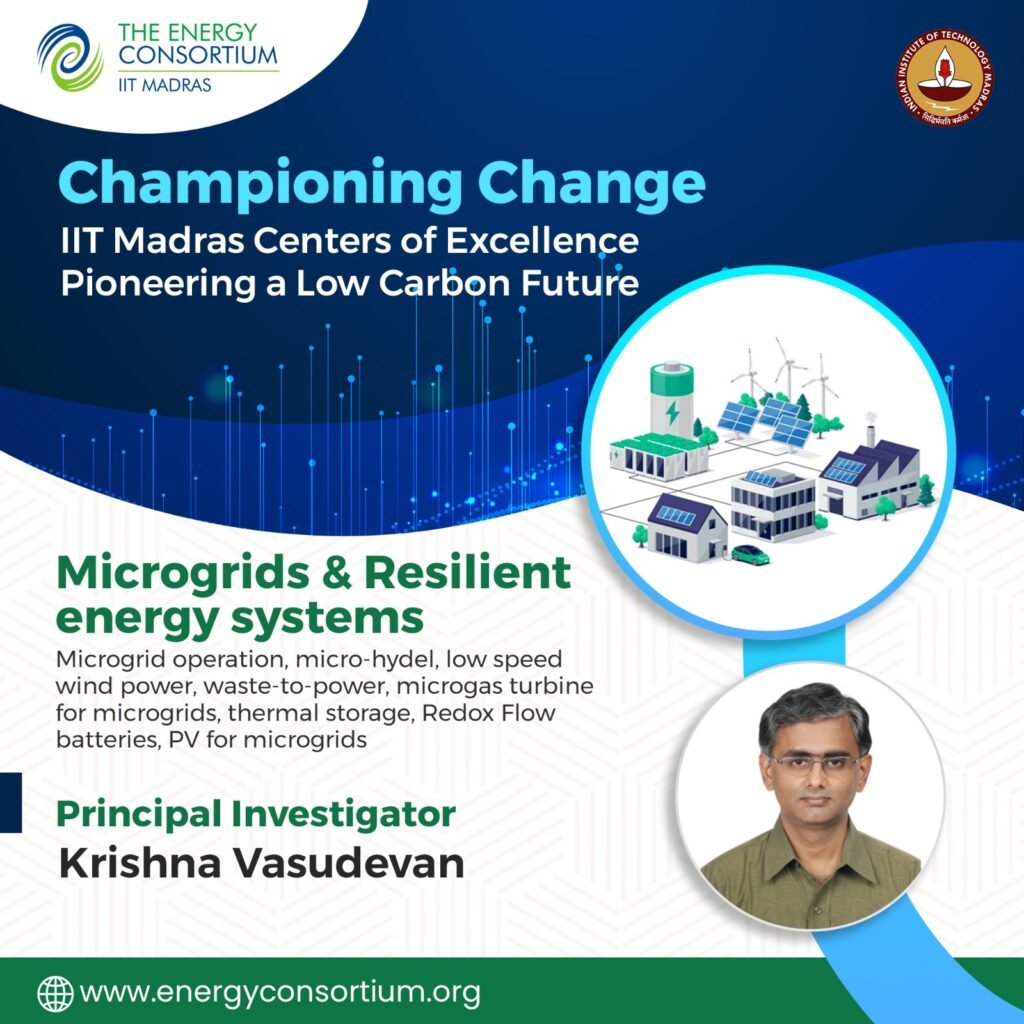
The Indian Institute of Technology, Madras (IIT Madras), through the Energy Consortium, is leading the charge in clean energy innovation. Their focus extends beyond carbon capture, venturing into ground breaking renewable energy systems
Under the guidance of Prof. Krishna Vasudevan, the Center of Excellence in Microgrids at IIT Madras is making significant strides in ensuring reliable and independent power. Their cutting-edge research encompasses decentralized control of distributed energy resources, integration of energy storage systems, power quality control through harmonic elimination, and advanced protection schemes.
Microgrids represent a promising future for energy systems, offering flexible, efficient, scalable, and sustainable alternatives to traditional power grids. As renewable energy technologies advance, microgrids are poised to become more prevalent, providing communities and businesses with a dependable and secure energy supply.
Wind Energy Research Gets a Boost: New Centre Focuses on Wind Power Innovation

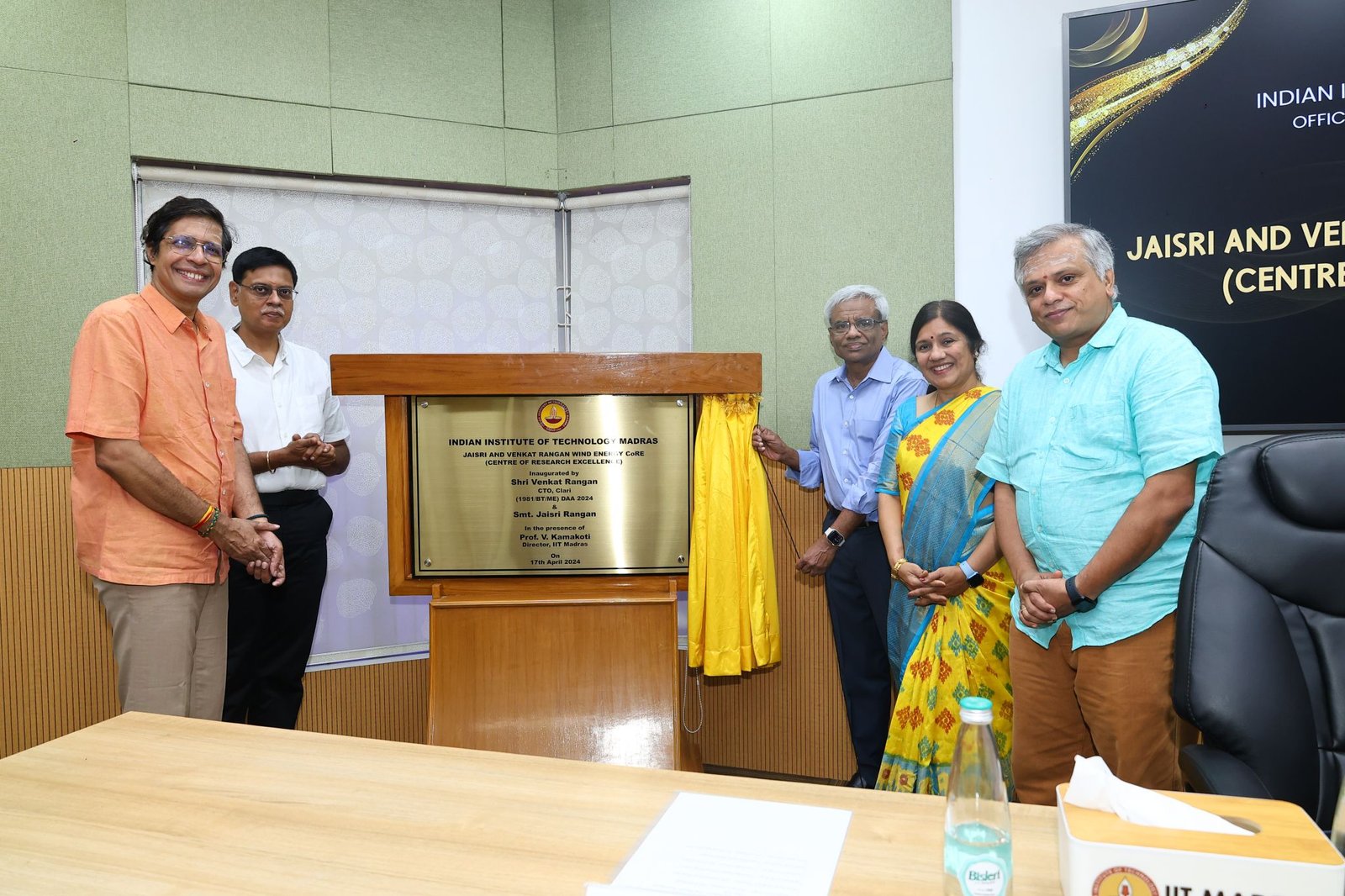
The Energy Consortium – IIT Madras fosters collaboration across all energy-related disciplines. Our expertise spans carbon capture, renewable energy integration, green hydrogen production, next-generation energy storage, distributed energy management for microgrids etc.
The Jaisri and Venkat Rangan Wind Energy CoRE, led by Prof. Chandramouli Padmanabhan is poised to revolutionize wind energy. This new centre tackles the full spectrum of wind power, from rooftop turbines bringing clean energy to remote locations to large-scale offshore wind farms. The CoRE’s focus includes both onshore and offshore wind energy, to develop cutting-edge technologies that maximize energy generation and minimize environmental impact.
Wind energy is a critical sector in the global pursuit of net zero emissions. The Jaisri and Venkat Rangan Wind Energy CoRE is committed to developing innovative solutions that propel us towards a sustainable future.
Roll out of the 2024 edition of our flagship TREND Setter program

The Energy Consortium – IIT Madras under its TREND Setter program, funds exploratory R&D and fundamental research that enables breakthrough innovation in areas aligned with the long-range research initiatives of our industry founding members. On Industry Day, the Industry Advisory Board awarded three proposals in a high-risk, high-reward track and five in an early career track. These awards focused on areas such as improving #energyutilization, materials for energy transition, synthetic biology or bio-mining for energy solutions, and niche applications supporting sustainable living.
This program represents an unprecedented effort of coordinated activities in India’s energy grand challenge areas. The Technology Research ENgineering and Development (TREND) Setter program continues to drive forward innovative solutions and groundbreaking research in the energy sector.
WORKSHOP & SYMPOSIA
Industry, Academia Join Forces to Tackle ESG Reporting Challenges

The urgency of environmental action resonates deeply and as we grapple with the challenges of climate change and biodiversity loss, industry has a powerful opportunity to become part of the solution. The industry is increasingly recognizing its role in environmental stewardship, and transparent reporting practices are crucial. This is where Environmental, Social, and Governance (ESG) reporting comes in.
To address challenges in this area, the Energy Consortium at IIT Madras in collaboration with the School of Sustainability, IIT Madras convened a workshop titled ‘Industry Dialogue on ESG: Reporting Challenges and the Path Forward.’ This event brought together industry leaders to discuss current ESG reporting practices and identify existing challenges.
Key discussion points of the workshop included the need for standardized ESG reporting approaches, the establishment of clear data collection guidelines, and ensuring data transparency, comparability, and traceability. Additionally, participants identified opportunities for industry-academia collaboration in ESG research. A significant focus was placed on the environmental aspect, emphasizing decarbonization and green technologies.
The workshop aimed to establish industry-specific environmental metrics, create sector-specific benchmarks, and foster dialogue between industry and regulators, paving the way for more transparent and impactful ESG practices in India.
Research Symposium
The Energy Consortium, IIT Madras hosted a Research Symposium on May 21st, focusing on the latest breakthroughs in energy transition technologies. Researchers, faculty, scholars, and students came together to share knowledge, forge collaborations, and accelerate progress in this critical field.
From harnessing renewable energy sources like offshore wind power to delving into next-generation battery technologies like sodium-ion and organic redox flow, the discussions covered the entire spectrum of advancements. Cutting-edge materials like halide perovskites and the potential of gas turbines were also explored. Furthermore, the symposium emphasized a holistic approach, focusing on crucial themes like energy efficiency, industrial emissions reduction, and enhancing overall productivity within the sector. This comprehensive exploration of various aspects of energy transition paves the way for significant progress in this critical field.
The symposium’s key moments featured an inspiring keynote from Prof. Rajnish Kumar and a comprehensive overview by Prof. Satyanarayanan Seshadri. The sessions were chaired by Swapna Singha Rabha, Arun Karuppaswamy B, Santosh Kumar Sahu, Rahul Muralidharan, Muruganandam T M, Raghuram Chetty, Nitin Muralidharan, and Nikhil Tambe, contributing to lively discussions.
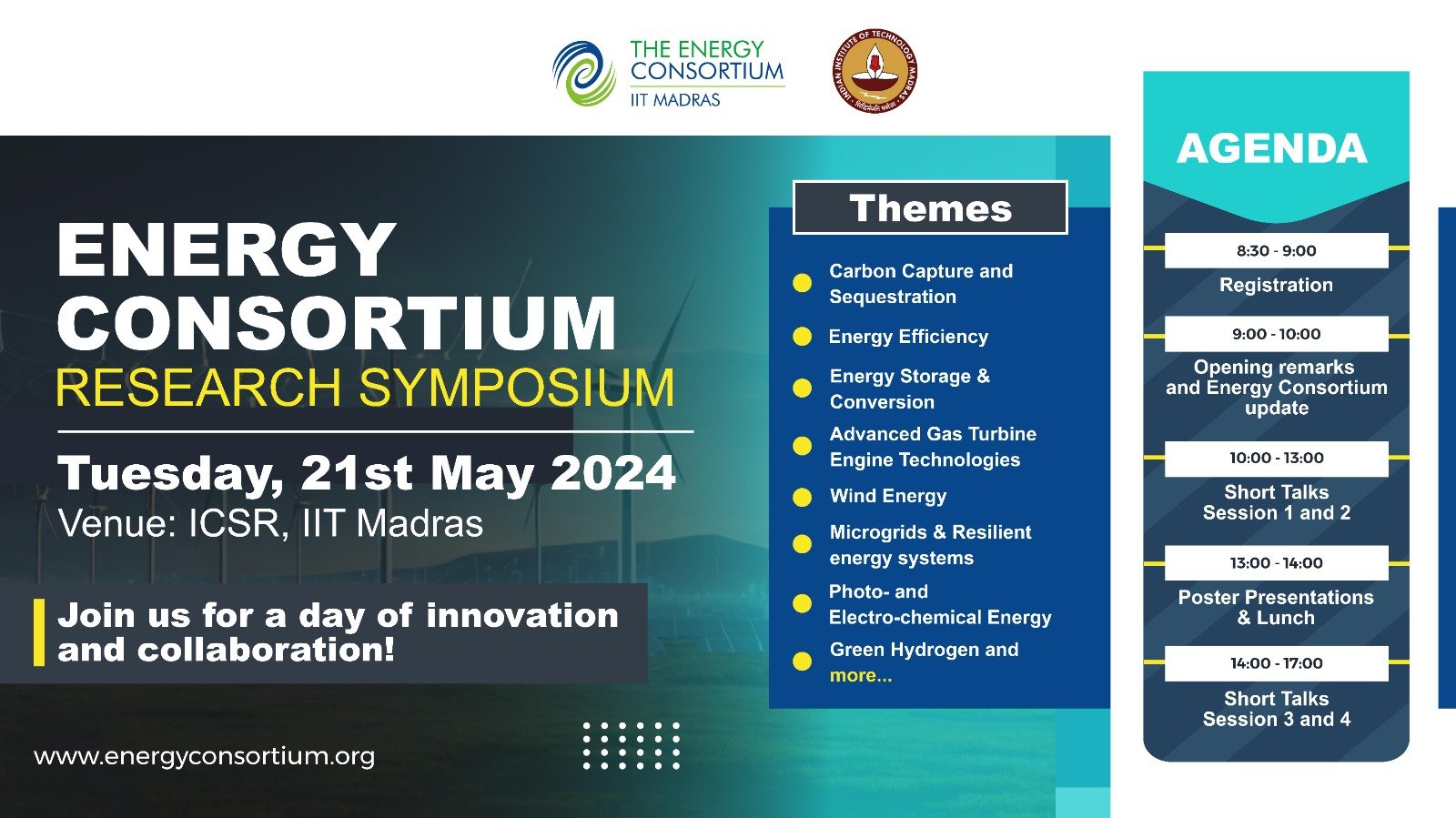
EDUCATION
Joint Masters in Sustainable Energy Systems Offered by IIT Madras & University of Birmingham
The Joint Masters Program in Sustainable Energy Systems, offered by IIT Madras and the University of Birmingham, is an 18-month academic journey starting at IIT Madras in Chennai and continuing at the University of Birmingham. The program provides invaluable international exposure, featuring opportunities for industrial placements and a year-long research project co-guided by expert faculty from both institutions.
After completing the second semester, students can tailor their experience by choosing between two tracks, allowing further specialization.
The course details are available at https://lnkd.in/g3c_E6PC
This unique program is designed to equip students with the skills and knowledge needed to lead in sustainable energy, making a meaningful impact on our planet’s future.
Summer Internship Program Commences at The Energy Consortium - IIT Madras
The 2024 Summer Internship Program at The Energy Consortium, IIT Madras, has commenced with enthusiastic participation from students across various academic disciplines. Running from May 22nd to July 21st, the program offers participants the opportunity to delve into cutting-edge energy research through goal-oriented mini-projects supervised by industry experts. Focused on advancing knowledge in energy generation, storage, and distribution, the internship aims to cultivate practical skills and foster innovation among talented young minds.
We anticipate that this program will serve as a launching pad for future breakthroughs in the energy sector. Stay tuned for updates on the program’s progress and achievements in upcoming newsletters.
NEWS
IIT Madras Makes Strides in Decarbonization with Ocean CO2 Storage!
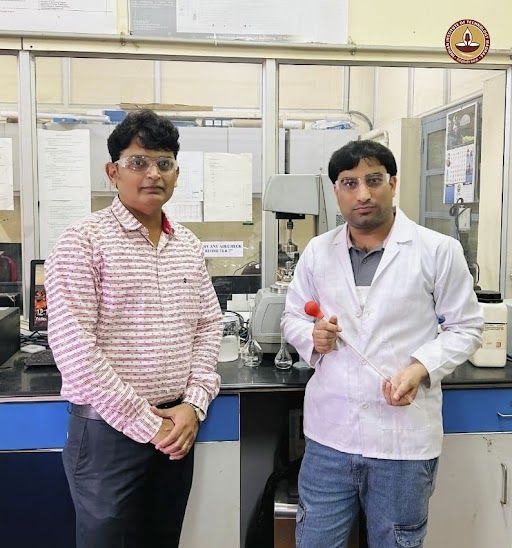
In a groundbreaking study led by Prof. Jitendra Sangwai from the Department of Chemical Engineering at IIT Madras, and Mr. YOGENDRA KUMAR MISHRA, a Research Scholar and Prime Minister Research Fellow, significant progress has been made in the field of CO2 sequestration. The research highlights the vast potential of the Indian Ocean and the Bay of Bengal as ideal locations for storing CO2 and achieving carbon neutrality for industrial clusters.
This research holds immense potential for India’s decarbonization and climate change goals, with the Bay of Bengal alone capable of sequestering several hundred giga tonnes of anthropogenic CO2.
The findings offer a promising solution to manage CO2 emissions effectively, leveraging the natural storage capabilities of oceans, which cover two-thirds of the Earth’s surface. This research represents a significant step towards a greener and more sustainable future, aligning with global efforts to combat climate change.
Chemical Engineering Tackles Climate Change with New Research!
Chemical engineers and researchers are collaborating to combat the climate crisis through innovative sustainable energy solutions. A special virtual issue of ACS Engineering Au, co-edited by Prof. Rajnish Kumar (IIT Madras) focuses on sustainable energy production and storage, alongside crucial decarbonization strategies.
This initiative, spearheaded by a team including Vivek Ranade (Deputy Editor, ACS Engineering Au) and Matteo Maestri (Politecnico di Milano, Italy), is a testament to global efforts in addressing greenhouse gas emissions and promoting a sustainable future.
Explore the latest developments and insights in sustainable energy and decarbonization by accessing the special issue @ https://pubs.acs.org/page/aeacb3/vi/SustainableEnergyDecarbonisation

ANNOUNCEMENTS
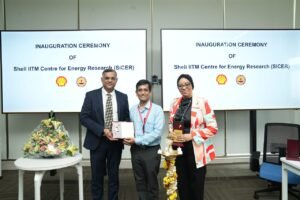
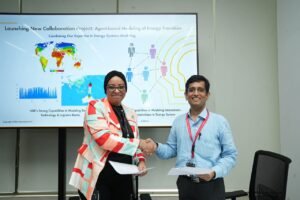
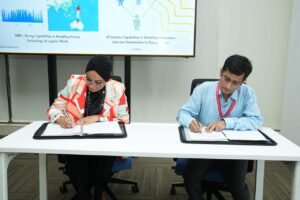
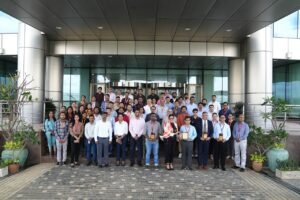
The Energy Consortium Launches Shell IITM Centre for Energy Research (SICER)
The Energy Consortium at IIT Madras is proud to announce the launch of the Shell IITM Centre for Energy Research (SICER). This joint initiative represents a significant step forward in fostering collaboration between academia and industry for energy research and development.
SICER will spearhead innovation in the energy sector through cutting-edge research and development efforts. Its focus extends beyond just developing new technologies; it aims to accelerate their commercialization for tangible real-world impact. The Shell Chair Professorship, a key aspect of this partnership, will foster a continuous exchange of knowledge between Shell and the Indian Institute of Technology, Madras.
Embark with us on the path to a sustainable energy future!
Visit our website for upcoming events and collaboration opportunities
Write to us with ideas to contribute and any suggestions at

